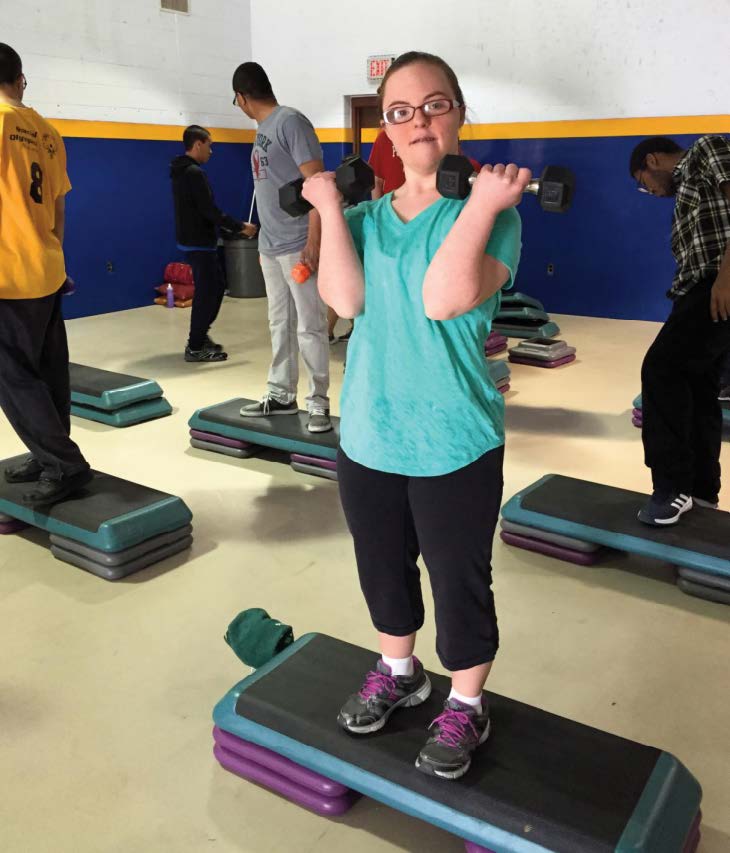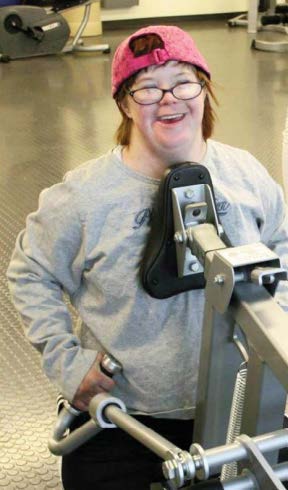
"The food you eat can either be the safest and most powerful form of medicine or the slowest form of poison."
Ann Wigmore
The Family Resource Network launched The Center on Nutrition and Disability, which aims to further assist families and professionals with fostering a healthy relationship with food for people with special health care needs, chronic conditions, and their caregivers.
One of the biggest issues people face today when determining a healthier dietary routine is maintaining it. Many of us have pantries filled with remnants of failed diets and super cleanses; some of us are recent offenders in the plight to maintain our New Year's Resolution. Two of the most popular New Year's Resolutions are: "Being more physically active" and "Eating right." While the former is easier to define and measure, the latter tends to be slightly challenging and is not exactly considered to be a Smart Goal. When a family tells me that they want their loved one to "eat right," I can't help but wonder, what exactly does this mean? What does it truly mean to eat right? Who came up with this definition, and does it take into account our cultural differences, and how exactly do I measure it? A simple Google search of "eating right" will lead you on a wild goose chase: a myriad of topics appear, ranging from maintaining a healthier lifestyle to selecting the latest fad diet for a monthly fee of $12.99. Of course, we all know the importance of a well-balanced diet, one that covers all of the food groups; but then why is it so much harder for some of us to simply do the right thing and make the healthy choice? Maybe it's time to go back to the basics.
BETTER BALANCE : Get Fit participant Lauren Sweeney practices tai chi as part of her fitness routine. The Get Fit program administrators discovered that nutritional education was a vital component for successful outcomes.
Our relationship with food is one of the most misunderstood and overly-complicated relationships. It doesn't really help that the abbreviation for the Standard American Diet is quite literally SAD. The majority of Americans, irrespective of their weight, have a relatively unhealthy relationship with food; most of us eat too much, some of us do not eat enough and then the large majority of us simply do not eat enough of the good stuff. The food industry and diet blogs have surely taken advantage of this, resulting in a multi-billion-dollar empire selling hopes, dreams and smaller waists. Experts report that many of our favorite meals are overly processed, yet to many of us, these enjoyable and typically unhealthy meals can be considered to be our Achilles heel - I simply cannot say no to a generous serving of truffle fries! Invite a nutritionist into your home, and the first thing they'll do is comb through your food pantry throwing away any unhealthy or over-processed items. While this is a positive, yet dramatic step in the right direction, what does this do for your relationship with food in the long run? How do we heal the disconnection?
At the Family Resource Network, we developed two key health initiatives for people with special health care needs – Get FIT and The Center on Nutrition and Disability. When Get FIT launched in 2008, we spent a significant amount of time measuring health outcomes among program participants. While their physical activity levels improved, we did not observe any positive change in their risk of obesity or diabetes. Within three months, we realized that we had ignored a key aspect to maintaining a healthy lifestyle. Their diet. It became apparent that at the conclusion of each Get FIT session, participants would go directly to the vending machine and purchase their preferred, and often unhealthy, snack. As soon as we added a nutrition education component to the program, we began to see results. Not only did we see a decrease in the risk factors that contribute to obesity and diabetes, but we saw an increased level of independence with relation to meal preparation among our participants.
So, what changed? Did Get FIT participants suddenly start to ignore their need for sugar at the conclusion of a workout? Not exactly. We simply transformed the narrative. It is extremely important to replenish your body appropriately after exercise - carbohydrates which are a form of sugar are stored in your body as glycogen. When your body is in need of that extra boost of energy during a workout, it draws upon these glycogen stores to keep you going. This is why you will often find yourself craving carbohydrates or sugar after a workout. By eating carbohydrate-rich foods, you are able to replenish your body so that your glycogen levels may be restored back to normal. Through the use of picture boards and other universal design for learning tools, we taught Get FIT participants the importance of replenishing their body after a workout, and shared healthier post-workout snack options, some of which were available in the very same vending machine! We taught the importance of staying hydrated throughout the day and explained every biological response that their bodies were experiencing as a result of their increased physical activity levels and the impact of their diet on each response. We even took farm to table one step further by including horticultural therapy into the program, allowing participants to get back to basics and grow their own vegetables. Within months, we were able to heal the disconnection and foster the growth of a healthy relationship between each individual and food.

STEPPING IT UP: Lauren learned the importance of replenishing her body with healthier post-workout snack options and staying hydrated throughout the day.
One outcome that we did not anticipate was the increased sense of independence one can experience as a result of understanding their relationship with food. A family caregiver of a Get FIT participant explained how her adult daughter who has Down syndrome is now responsible for grocery shopping for the entire family; not only does she maintain the list of grocery items throughout the week, but she also determines the healthiest option for each item by comparing Nutrition Facts labels while at the grocery store. Another Get FIT participant who has autism is now able to administer his own medication as a result of Get FIT's Young Gourmet Cooking program where he learned how to follow recipes and measure ingredients.
Healing the relationship with food for these Get FIT participants made the healthy choice the easy choice while fostering an increased development in their skills for independent living. Such outcomes prompted The Family Resource Network to launch The Center on Nutrition and Disability which aims to further assist families and professionals with fostering a healthy relationship with food for people with special health care needs, chronic conditions, and their caregivers. Most recently, the Center developed two picture-based cookbooks which increase the opportunities for visual learners to create their favorite healthy recipes independently. Each recipe in the first cookbook was selected by Get FIT participants as they continue to collaborate with program developers to ensure an inclusive voice in all programs and actives. The second cook book was developed using recipes that can be created on a SNAP budget using locally accessible foods. Recognizing the various cultural backgrounds among Get FIT participants, the Center's next cookbook will feature recipes from different parts of the world.
The Center on Nutrition and Disability's Dine with an Expert webinar series, which will launch later this year, will bring experts in the field of dietary therapies to the table so that families may have access to accurate and evidence-based dietary information. The two most popular topics relating to questions about at the Center pertain to gluten-free diets and the ketogenic diet. While we typically refer these questions to local experts, we recognize that there is a lot of misinformation on the internet about these dietary therapies. Gluten-free diets have more recently been added to the list of widely misused diets and are not always accompanied with medical advice or recommendations from an expert. Medical professionals often prescribe gluten-free diets for individuals who have celiac disease or a gluten sensitivity. However, many health enthusiasts have adopted and transformed the gluten-free lifestyle into a "get skinny quickly" fad.
I recently watched a television show that featured two individuals debating who was healthier; one was on a self-prescribed strict gluten-free diet, and the other was practicing portion control. After extensive lab tests, their physician concluded that they were both equally healthy. With the depth of misinformation available online pertaining to such diets, the Center will adopt many of the Get FIT practices by focusing on providing accurate and accessible information directly to the families who truly need it. Through simple recipes, accurate fact sheets and webinars that feel like informative dinner parties, the Center on Nutrition and Disability aims to become your inclusive partner in creating and maintaining a culture of health in your home as you seek to heal your relationship with food. •

HAPPY OUTLOOK: Participants experience an increased sense of independence as a result of understanding their relationship
ABOUT THE AUTHORS: Adeola Sonaike, PhD, MPH, CHES is the Senior Vice President of Health at The Family Resource Network, where she works to advance the health of people with special needs, chronic conditions, and family caregivers. Dr. Sonaike attended Rutgers University where she attained a Bachelor's in Biology, and Walden University where she attained a Master's in Public Health and a PhD in Public Health- Epidemiology. Dr. Sonaike is also a Robert Wood Johnson Foundation Culture of Health Leader where she is focused on building an inclusive culture of health.
The Family Resource Network (FRN) is a comprehensive, family-focused, organization designed to meet the growing need for community based programs and services for individuals and their families with continuing needs. For almost 50 years, FRN has helped thousands of New Jersey families with a variety of disabilities and chronic conditions connect with resources and support services they need to live full and happy lives. FRN's network agencies are: Autism Family Services of NJ, Caregivers of NJ, Epilepsy Foundation of NJ and the Family Support Center of NJ. Please visit familyresourcenetwork.org for more information or call (800) 376-2345.
